#emmett honeycutt
Text
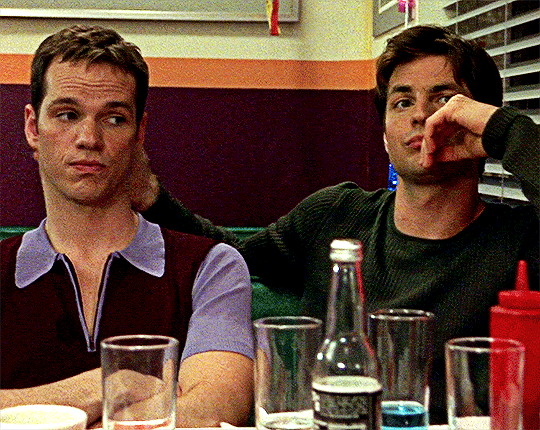
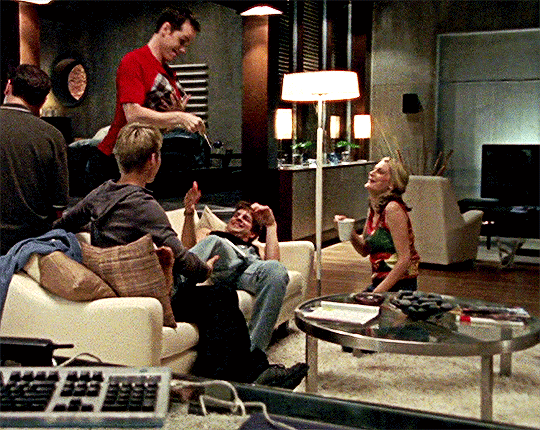



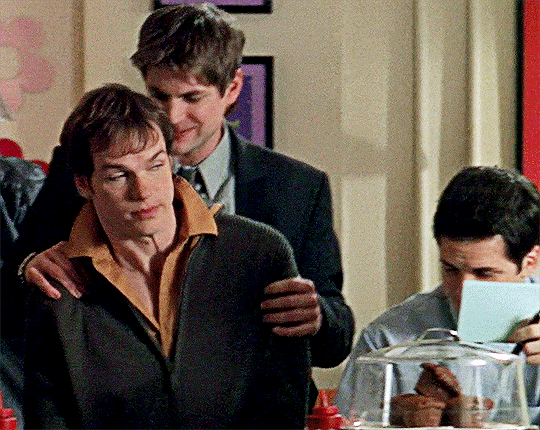

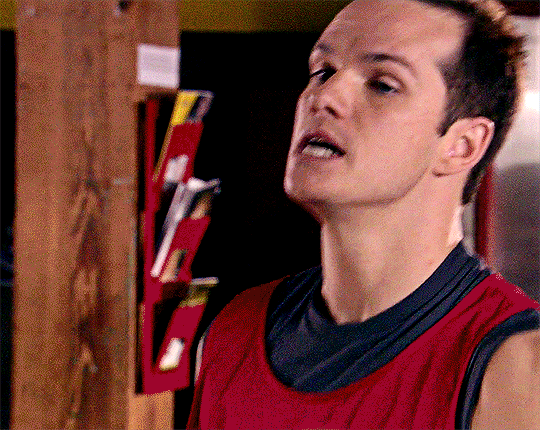

Brian and Emmett making each other laugh
#queer as folk#cinematv#cinemapix#filmtvcentral#userthing#smallscreensource#userrlaura#usernuria#mlmsource#usergay#lgbtedit#tvarchive#dailyflicks#userstream#userbbelcher#brian kinney#emmett honeycutt#1x05#1x07#1x18#4x01#4x02#2x06#5x13#5x01#would die for them it's casual
175 notes
·
View notes
Text

#britin#luv them#queer as folk#qaf#userrlaura#cinemapix#filmtvcentral#cinematv#tvgifs#tvedit#televisiongifs#mediagifs#tvarchive#lgbtq+#ted schmidt#emmett honeycutt#1x17#the quality hlp
139 notes
·
View notes
Photo

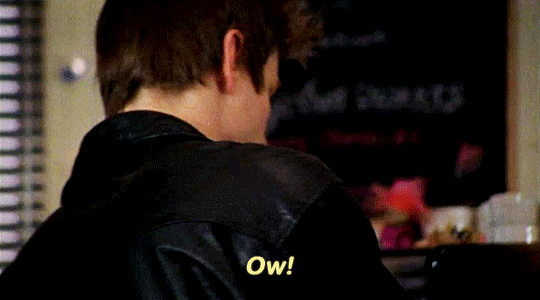
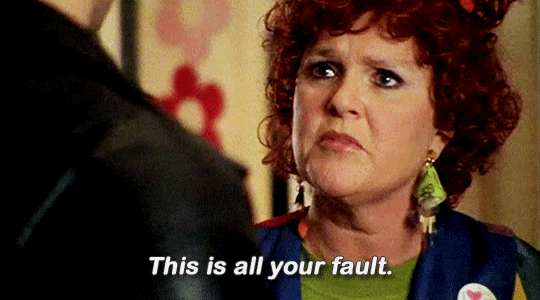


Justin's run away.
#me the first few years of watching this show: brian has never done anything wrong ever. they are too hard on him#me now: punch him again#qafedit#queer as folk#brian kinney#daphne chanders#debbie novotny#michael novotny#emmett honeycutt#ted schmidt#also love that last shot of michael em and ted their faces are so funny#mine#psd*#110#ID in alt
164 notes
·
View notes
Photo

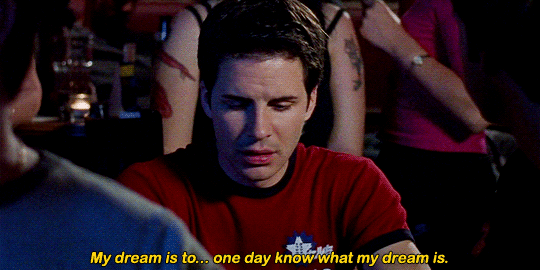
#qafedit#Queer as Folk#emmett honeycutt#michael novotny#qaf#s2#2x05#lgbtedit#lgbtsource#dailylgbtq#bbelcher#cinemapix#filmtv#chewieblog#userstream#cinematv#tvandfilm#tvandfilmdaily#dailytvfilmgifs#mine
165 notes
·
View notes
Text

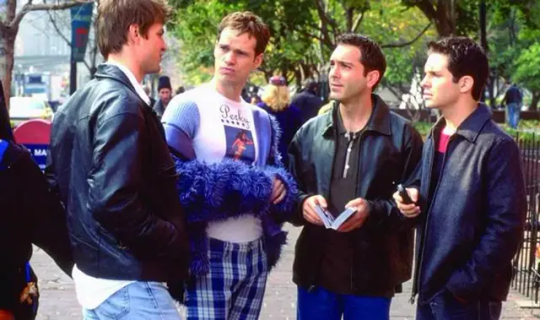
i love the spice girls
#qaf#brian is victoria#looks looks looks#queer as folk#brian kinney#michael novotny#emmett honeycutt#ted schmidt
134 notes
·
View notes
Text
every time i rewatch queer as folk, i fall in love a little more with the series. i fall in love a little more with the characters. i fall in love a little more with the stories and the relationships and even the endings that each of these couples got.
i know some people don’t like brian and justin’s ending, but it was perfect for them as characters. their love was never meant to be a locked door, keeping them in place. instead, they were characters that helped each other grow, that pushed each other to always be the best versions of themselves - whether it was risking literally everything to take down the corrupt politician in season three or accepting the heartache and the pain of not being together so justin could follow his dreams in new york.
if the two of them had gotten married in the finale and had the traditional happily ever after, it would’ve been a disservice to both of their characters. neither of them wanted a life where the other sacrificed everything to be with them and called it love, because that wasn’t the type of love they had. they had a love with no locks on the doors or bars on the window and because of that, the ending they got with each other was perfect.
it was the perfect culmination of five years of story and development. (but i do believe they ended up finding their way back together and live together in a happy open marriage where they never hook up with the same person twice and never kiss anyone else on the lips but each other.)
the fact that blake and ted ended up back together makes me so happy every fucking time. their on again and off again story was a great through line in the series -- revisited every now and then because they were always the right person, wrong time relationship. seeing them dancing at babylon in the end? they’re finally the right person at the right time. they finally grew into two people who were healthy for one another and ted got his birthday wish: to love himself as a whole and to then find someone else who loved him as a whole, not as a half waiting to be completed.
and of course ben and michael ended perfectly as did mel and lindsey. no notes. i do think emmett and drew one day found their way back together. they had a similar storyline to ted and blake -- right person, wrong time. drew was one of the few people who was able to match emmett and emmett brought out the best in drew.
and of course, michael and brian are still, to me, the heart of the show. their friendship and the love they have for each other and the way it changes over the show and the way they change -- only to end dancing together at a rebuilt babylon? perfection.
so much in the world has changed since 2005 when queer as folk ended, but so much has stayed the same. there’s still so many parallels to be drawn from the show to the modern world and that part breaks my heart. we’ve come so far, but we’ve still only taken baby steps.
but in the words of michael novotny: and so the thumpa thumpa continues. it always will. no matter what happens. no matter who’s president. as our lady of disco, the divine miss gloria gaynor, has always sung to us -- we will survive.
#queer as folk#qaf us#queer as folk us#brian kinney#justin taylor#britin#michael novotny#ben bruckner#emmett honeycutt#ted schmidt#the show got me in my fucking feels again#sorry for the very long rant#but i ended up deep in my feels#qaf meta#i guess?#idk just ramblings#because damn that is a lot of ramblings
100 notes
·
View notes
Text
twenty-two years ago, brian kinney met the one person who, he didn't realize at the time, would, sometimes consciously, other times unconsciously, help break his phobia of growing up by showing him there is more to life and his persona than beauty, there is power in love and vulnerability, there is joy in trusting what the future holds.
twenty-two years ago today, brian kinney's son was also born, a ticking-clock reminder that he's getting older by the minute, an opportunity for brian to be the man he was deprived of: a parental figure.
and in twenty-two years, i know that brian kinney continued growing up, working on his demons, teaching his son there is indeed power in love and vulnerability, there is joy in trusting what the future holds, there is pride in allowing yourself to change.
in twenty-two years, i also know brian kinney is still the most iconic, beautiful, cynical, unapologetic, chaotic, drama-queen, hilarious, imperfectly perfect fictional man to ever exist on cable tv.
he feels real to me. and i'm proud of him.
happy birthday, queer as folk.
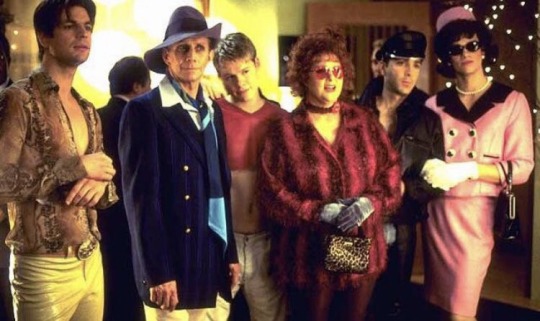
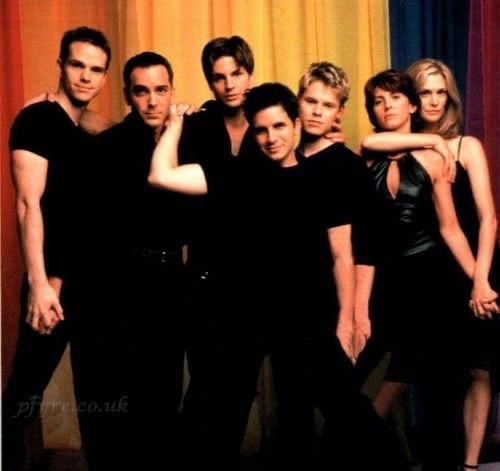
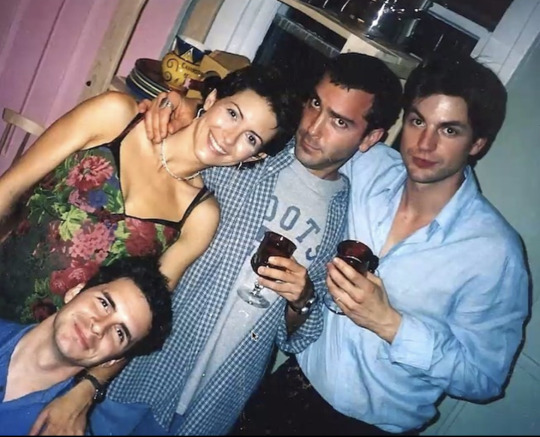
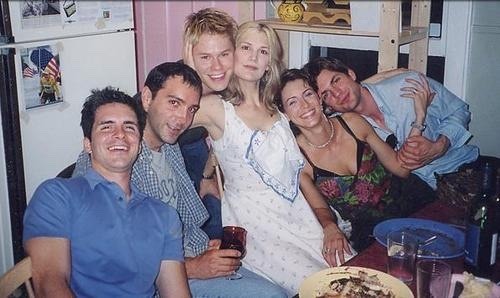
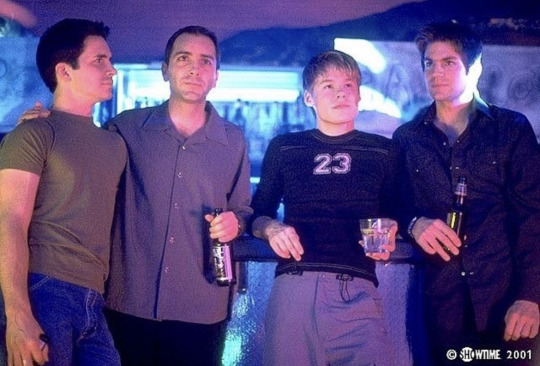
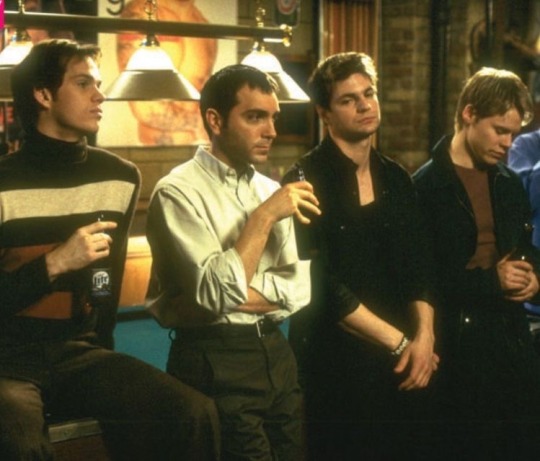
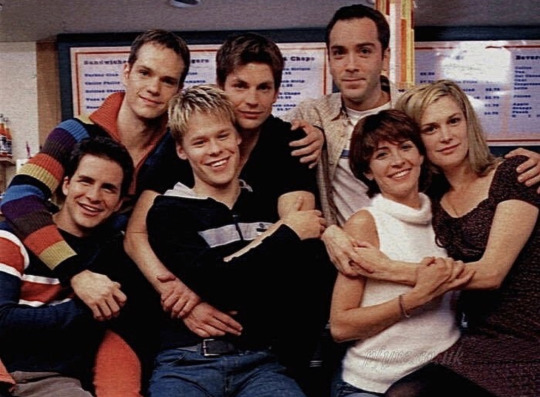
#happy birthday you are as old as me#i could have been gus#i'll never shut up about this#it changed lives#it actually did i'm still in utter amazement how they pulled this off in the YEAR 2000#first paragraph is about justin and second paragraph is about gus btw#qaf#queer as folk#queer as folk 2000#queer as folk us#qaf us#gale harold#randy harrison#britin#brian kinney#justin taylor#brian x justin#emmett honeycutt#qaf 2000#ted schmidt#ben bruckner#melinds#melanie marcus#lindsay petterson#vic grassi#michael novotny#don't wanna tag him but#my posts#mine#textpost
277 notes
·
View notes
Text

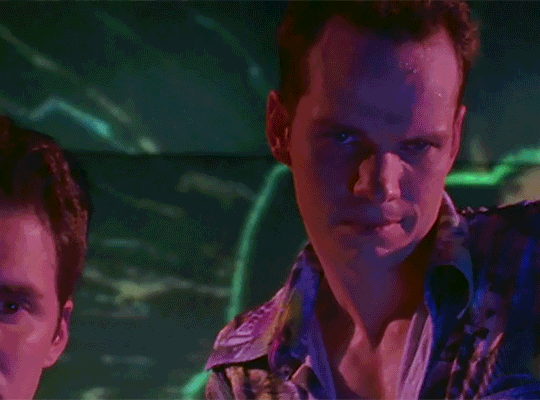
what is he doing
#micheal's face haha suck it loser#queer as folk#qaf#brian kinney#justin taylor#britin#michael novotny#emmett honeycutt#lgbtsource#nah cus how he scored with that kind of dancing is beyond me#no wonder he only wanted to dance with justin afterwords#he was tired of pretending#qafedit#queer as folk us#queerasfolk
18 notes
·
View notes
Text
Why Queer as Folk (2000) Was Seemingly Forgotten
An analysis by a professional TV Critic
Let me start off by saying the initial run of Queer as Folk and its current resurgence can be represented by this mantra by Brian Kinney: There are two kinds of straight people. The ones who hate you to your back and the ones who hate you to your face.
The initial run of QAF coincides with the first half of the statement: hate behind your back.
So, recently I started thinking about how in the early 2000s, Queer as Folk seemed to be on a trajectory of going down in TV history. Then, seemingly just as quickly, people stopped talking about it. So much so that by the time I finished watching it in 2009, I only got a few good months of chatter on social media platforms (Twitter mostly) with other fans before it just stopped being talked about in a wide-reaching manner.
I will even admit that I stopped thinking about the show not long after that and wasn't reminded of its full impact on my psyche until late last year when it was back on easy-access streaming due to Showtime's merge with Paramount+.
But why is it that this show is only just now starting to pick up speed again? (I'm talking fan cams on TikTok, memes, etc.)
I have some theories about all of this, so buckle in.
To really get a grasp of what Queer as Folk was working against when it aired on Showtime -- a paid subscription channel back before the days of an overabundance of streaming services, you have to look at the climate we were living in. Also, how inaccessible a paid TV channel was for most people.
So, in the early 2000s, life in the United States, and probably the world, but I'm not fully educated enough to comment on that, wasn't the greatest for those in the LGBT+ community. It would be years before the President of the United States would pass legislation that Gay Marriage be legal nationwide.
Employers were able to fire people for being gay, and the employees couldn't fight it. Gay parents had very little in terms of rights to their own children; in fact, some couldn't even adopt the kids they wanted to because there were no laws against discrimination.
All of these things are depicted left and right throughout Queer as Folk, with Ted getting fired from his job, Michael being extremely closeted at his job, and Melanie not being afforded rights to Gus because of adoption regulations during that time.
So, for our community to receive a show that was by us for us, we were overjoyed. There was something so resolutely refreshing about the unapologetic manner in which these characters were allowed to present themselves and live their lives. And while the show gets dinged today for its lack of racial diversity, we were glad to see queer people represented in a variety of ways -- we got to see the Emmett's and Justin's of the world being friends with the Ted's and Michael's and Brian's.
Not only that, these characters got to love who they wanted, however, they wanted, and whenever they wanted. Characters like Michael and Emmett could go from wanting to freely fuck whoever to finding that special person and settling down. We got to see Ted find the right guy at the wrong time over and over and over again until it was finally the right guy at the right time.
But most of all, we got to see a character like Brian, who, in the hands of a straight person, might've actually gone "soft" and "domestic" just by being with Justin. Instead, we got to see him never change his opinion about what he wanted, but still finding love in his own way.
However, not long after the show ended (like around 2008), the climate in the United States started to shift more towards open acceptance of the queer community. So, people stopped needing an escape from the hardships of real life because things seemed to be on an upward trend toward love and equality. Therefore, Queer as Folk sort of fell off the radar of viewers because we didn't want more of the gritty, complicated, messy queer stories. We wanted our stories to be happy and lighthearted.
(Keep in mind I am speaking in terms of general viewers. There are always exceptions to the rule)
Then, in 2016, Donald Trump was elected President of the United States, and suddenly, it was totally okay for people to openly mock us and hate us.
This is where the resurgence of QAF falls into the second half of Brian's mantra: hate us to our face.
Around 2016/2017, people started talking about this show again. And the love and fervor for it has only increased exponentially over the last few years, especially with the onset of COVID-19 and the merging of Showtime/Paramount+. Both events made the public more aware and able to access the show.
Now more than ever, we need something that isn't afraid to show queer people as we are, not as the media and those outside our community paint us. We need to feel like there is a media format that understands what we are like when we are with our closest friends. We say things that, in today's world, would probably get us canceled, and we judge those around us and have very biased opinions about certain people.
Brian Kinney's unapologetic "I am who I am and fuck anyone who tries to change me" attitude is the exact level of strength and courage we wished more people right now had. His biased, but not illogical, opinion of non-queers needs to be loud. It needs to be shouted from the rooftops because we now live in a world where we are hated just for existing as we are.
Even our rights that had been given to us just a decade ago are being stripped away from us once more. So, the fight for love and equality continues, and the hope that Queer as Folk gives us is important now more than ever.
So, people are seeking this story out and are begging others in the world to watch it and understand that we have always been here. We've always been these flawed but loving characters. We deserve to be heard.
In 2022, Peacock tried its best to create a redo of the series but failed miserably. But why? If we are desperately looking for queer media that is gritty, unapologetic, and real, then why didn't we latch onto this latest iteration?
The answer is simple. This new version was great at creating a more diverse image of the characters created for the Showtime series but failed to understand that recreating things almost note for note with entirely new characters isn't what we want.
It would've been better if the show stuck to broad-stroke themes and made these characters and their experiences their own. Queer today is different than queer in the early 2000s, just like queer in the 2000s was different than queer in the 1980s. Trying to put queer 2000s stories into a queer 2020s world isn't going to work.
We need to embrace this resurgence of Queer as Folk (2000) and give it the love and attention it should've always had. Perhaps finally giving its rightful due in the eyes of the history of queer media. Does it have its issues as the world changes? Absolutely, but we also can't sit here and deny the insane level of impact this show had on the queer media we now know and love.
We wouldn't have casually queer shows like Schitt's Creek, Heartstopper, and Our Flag Means Death if Queer as Folk hadn't broken down our walls and made us realize that we can demand stories for queer people by queer people.
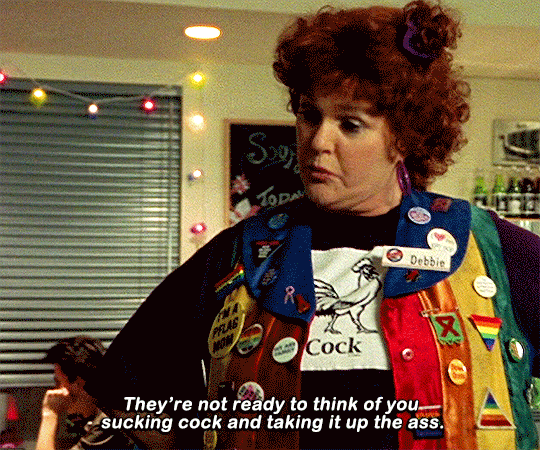
#queer as folk#brian kinney#justin taylor#emmett honeycutt#ted schmidt#michael novotny#TV retrospective#TV history#queer history#looking at QAF from the lens of social queer climates then and now#opinions of a professional TV critic
14 notes
·
View notes
Text
I asked @britinbliss for their favorite britin scenes and also for their favorite qaf scenes in the whole show, and I am sooo happy that they answered, and they asked me to answer the questions too, so here we are.
My favorite britin scenes:
5. I really love their first time sex scene cause it was so intense and just beautiful and really hot. Especially, I love the rim-job Brian gave Justin. It was so beautiful when Brian's tongue runs over Justin's back and a small drop of sweat caught on her. And Justin moaning when Brian's tongue got in his ass was just so intense. I love it!
4. The pride party scene at the end of the pride episode is sooo beautiful. Justin accepted who and how Brian is and wanted to leave, so Brian can do what he wants to do, but Brian just wanted to dance with Justin is such a huge step in their relationship. "Hey stud, wanna dance with me?" "Shut up." "I promise you won't forget this one." makes me giggling and smiling every time cause it is just so cute and beautiful. Brian would literally do anything for Justin, and we see this in season two. Season five is so far away, but we can see that Brian really cares about Justin and loves him. Brian is just proud of Justin cause he made it. He showed his pride and he got over the thing with Chris Hobbs. Brian taught Justin so much and this scene shows this and is just lovely.
3. Of course, I really love the scene in s5 ep10 where Brian says "I love you." for the first time. I cried so much when I first saw it because we all waited so long for this moment, and it was soooo beautiful. Brian showed Justin that he loves him for five seasons (not straight lol) but when he said it a new era began.
2. Also, one of my favorite scenes is when Brian brought Justin to Britin and said he would do anything and be anyone to prove Justin that he loves him and that he meant it when he said he wants to marry him. The best part of this scene is when Justin said, "You bought this! This Palace!" and is totally in shock and Brian just answered "It's for my Prince." And when they made love on the floor in front of the fireplace, I was crying again.
1. My all-time favorite scene is their reunification in season three. How they are laughing and smiling while kissing and undressing each other is so beautiful. I can see that Brian missed Justin so much, and he wants him back soo badly. I just love this. And how they dance after this in Babylon is just perfect. Ben was so right when he said, "The biggest reunion since Germany" (which is so meaningful and funny to me because I am German). But I can not stay with my top five, cause my second all-time favorite scene is when Brian and Justin are celebrating that they betrayed Stockwell (of course they are celebrating with sex) and got interrupted by Stockwell and Gardner Vance. The sex in this scene was so intense and how they undressed each other was just beautiful. But what I also like about this scene is that Brian said "Wanna finish?" after Stockwell and Gardner Vance were gone. He doesn't seem to be mad about Justin and what happened. He wanted to go back to Justin and fuck his brains out like he always does, cause he hates it to get interrupted when he has his time with Justin.
To write down my top five was really difficult cause I love nearly all the britin scenes the show gives us, but I tried.
My favorite scenes from the show in general:
5. I really love the scene in s3 ep14 when everyone at Liberty Avenue is celebrating that Stockwell lost the election and Mel and Lindsey had their absolutely cute moment. They were sooo happy together, and I loved them very much in that scene. I also love the britin scene in the last moments of season three when Brian said, "I guess I've lost everything." And Justin answered, "Not everything." to show Brian, he will stay with him no matter what happens.
4. I also really enjoyed the scene in s1 ep1 when Daphne asked Justin where he was, and he just said, "I saw the face of god! His name is Brian Kinney." This scene is so funny but also shows how much Justin felt in love with Brian after one, okay two times, they had sex.
3. And you're right! I love the scenes where the whole group of friends helped for Mel´ and Lind's wedding. It was such so beautiful how they all worked together and Mel was soo happy about this. In my opinion, she wanted to hug Brian, but she knew it would be awkward for both of them, so she just smiled and punched him softly.
2. I really liked much of the scenes with Emmett and George. In my opinion they were a good and cute mature couple. And Emmett was so tough with the thing with George's money to give the whole money back to his awful family just to make his point clear.
1. I really don't like Cody Bell and what he made Justin do, but I love his little argument in the church with the reverent. "What's your point, young man?" "I believe the point is, if you can eat shrimp, we can eat cock!" I love this quote. It's so on the point and so true.
My favorite episode:
I would say my favorite episode in the show is s2 ep9, cause in serious times it's nice to watch it and just laugh about it. This whole episode is just funny and nice. The beginning where Brian fucks the reverent is so cool, cause in first place I thought Brian is just fucking around as always, but then he leans to the side and kisses Justin. And Micheal says they have a date night. Their definition of a date night is so cool. And then the whole thing with Ted taking viagra and the conversation on Mel´and Linds´ veranda, "What do you mean, you still have an erection?!" "Thank you, CNN!" is just so hilarious. Brian's idea to spook Ted's penis and when he said Mel and Lindsay should show him their tits to turn him of is soo funny. And after that, the scene where Justin and Brian really stole Teds viagra and are fucking for the tenth time this day and their conversation "I can't believe you're fucking me again." "It was your idea to steal Ted's viagra." is so fucking hilarious, too. The whole thing with Brian's mum is so shitty, and I hate Joan so much that it's actually funny again. How Brian holds his hands in front of his erection, so his mum can not see it, is so funny. I just love everything about this episode, so I should stop.
I could write so much more about other (favorite) episodes, so I should stop. It's too much.
I hope you all can understand what I wrote in here. English is not my first language, but I really try.
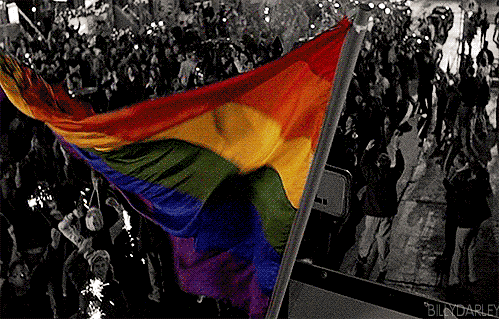
#queer as folk#brian kinney#britin#qaf#The whole thing escalated a bit#qafus#queer as folk us#michael novotny#emmett honeycutt#debbie novotny#ted schmidt#queerasfolkedit#queerasfolk
32 notes
·
View notes
Text
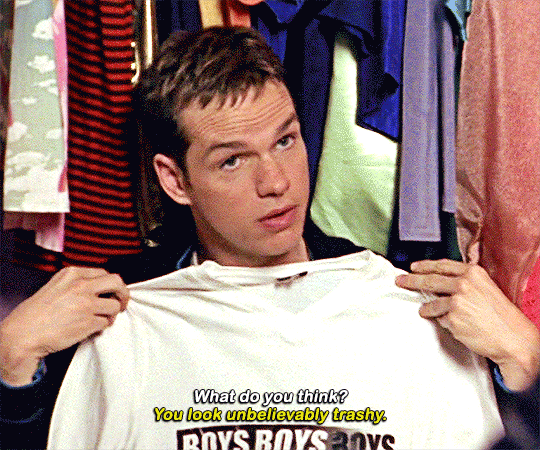

#queer as folk#cinematv#cinemapix#filmtvcentral#userthing#userrlaura#usergay#mlmsource#tvarchive#smallscreensource#emmett honeycutt#ted schmidt#em is perfect no notes#1x06
113 notes
·
View notes
Text


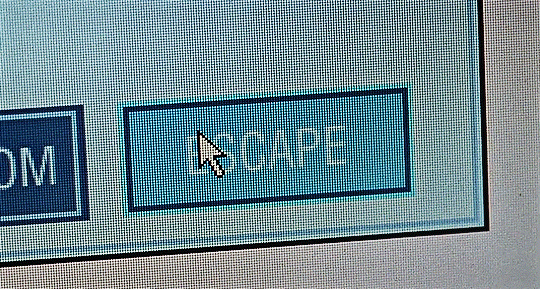
#britin#the way brian wld’ve been in his car almost halfway there#queer as folk#qaf#userrlaura#cinemapix#cinematv#filmtvcentral#tvarchive#usergay#chewieblog#userbbelcher#televisiongifs#mediagifs#lgbtq+#tvedit#tvgifs#emmett honeycutt#qafedit#1x09
69 notes
·
View notes
Text
People requested more of my Queer as Folk hot takes, so here is Part 2:
The gang and Debbie were all terrible people and enormous hypocrites when they tried to dissuade Michael from dating Ben. They know Michael knows how to practice safe-sex. They know Michael is familiar with what care being HIV+ can/will eventually entail. He's grown up with Vic as his uncle. He's seen the worst. The gang (and most especially Debbie) were horrible and should have known Michael was smart and strong enough to have a partner who was positive. Debbie saying she doesn't want Michael and Ben to be together is diametrically opposed to her as a character, and I fucking hated it.
All of them were also bad friends/family when they encouraged Michael to move to Oregon with David. Well into Michael and David's relationship, Michael's friends should have pointed out to Michael that David didn't value him as a person, was condescending, never compromised, was trying to make Michael conform into someone he wasn't, etc. True, you can't help who you fall in love with, but real family/friends would have taken you aside and pointed out the way your relationship wasn't healthy before you got super invested, so you could at least try to fix issues before getting involved with someone deeper.
I love Michael with my whole heart and fully identify with this hot take, as I struggle with it as well. Michael is a doormat. He's always bending over backward to defend people who would never do the same for him- the biggest culprit being Brian. Michael is constantly going against his own values to defend Brian's shitty behavior towards everyone, even Michael himself. His and Brian's friendship is incredibly unhealthy. Hal Sparks and all of us were talking a while back, and he said that Michael wouldn't be as bad with that today, since being with Ben for almost 20 years (Hal and Robert Gant both agree they'd still be together) would have helped Michael gain more confidence to know he, and others, deserve better and to hold people accountable for shitty behavior. Well, Michael would stick to that most of the time.
The show's depiction of Brian's opinion on romance and relationships was muddled. The show begins by showing Brian as aromantic, which is totally valid. As time goes on, they make Brian's desire not to be in a romantic relationship, and his promiscuity seem unhealthy and just the result of psychological damage. That's harmful to the aro and ace community. I'd much rather the show have stuck with him being on the aromantic spectrum, with Justin just being his exception to the rule (which is also valid for us aro folx), instead of making Brian's life choices seem like some kind of damage or childish positions to have. Maybe that's just me, as I don't want kids, have zero desire to get married, and have very little desire to be in a relationship.
What are some of your QAF unpopular opinions? Tag me if you do this, or put yours in a reblog. I'd love to see them.
Here's PART ONE of the hot takes if anyone is interested:
#queer as folk#qaf#queer as folk us#britin#queer as folk 2000#qaf 2000#qaf us#brian kinney#gale harold#justin taylor#randy harrison#michael x ben#ben x michael#ben bruckner#robert gant#qafamily#justin x brian#brian x justin#emmett honeycutt#ted schmidt#debbie novotny#sharon gless#michael novotny#hal sparks
38 notes
·
View notes
Text
WHO doesn’t love a bratty Justin? And wtf is Brian doing with that ugly lamp?
6 notes
·
View notes
Text
I've been dying to ask our lil Queer as Folk fandom...
I didn't include Britin because I know how we all feel about them 🫶🏼
#my wife tried to pressure me into putting ethan/justin#i will NOT#not on my blog#britin#qaf#queer as folk#brian kinney#justin taylor#emmett honeycutt#ted schmidt#michael novotny#ben bruckner#debbie novotny
19 notes
·
View notes
Text
The Masterpiece That Is Queer as Folk
Well, right before a reboot is set to come out, I finally got around to watching a show I first heard about (albeit without knowing the name) when it came out while I was like, eight years old. I then got in huge trouble for even mentioning to my parents that a friend had told me about a show with two boys french-kissing in a shower (okay, eight would’ve been way too young to see it, but still, fundie Christian memories ✨).
And, I fell hard for this story. I genuinely think this is one of my favorite stories ever, definitely favorite TV show, with writing to parallel MXTX’s levels of wringing the most potential out of every little detail. The writing is of a consistently high quality throughout its five seasons, without a single weak season (although there was the occasional weaker plotline), which is something I don’t think I can say for pretty much any other completed TV series I’ve seen. I love, love, love this story, and those of you know have been following me for awhile know how rarely I say that.

It’s explicit, often gratuitously so, but honestly that’s part of its charm and message: it’s loud and unashamed of itself, even when that makes it crass. It’s tired of being shut up inside a closet and it’s going to make it your problem if you choose to watch (and in doing so, mimic the journeys of its characters learning to feel and love and grow into human beings without apologies).
Brian, Justin, Hunter, Ben, Michael, Debbie, Emmett, Ted--they were all fantastic characters with complexity to boot. It seemed like many of them could be stereotypes--particularly Brian or Emmett--but to call them stereotypes is blatantly wrong. There was just so much intricate complexity woven into each character’s psyche. If anything, it seemed almost like taking back the stereotypes by infusing them with humanity (one of the major themes: learning how to be human). It was existentialist, philosophical at parts, and genuinely moving.
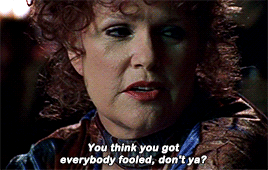
Brian could be seen as a stereotypical promiscuous gay man, but he is really a wounded child. Melanie can seem like a typical “butch” lesbian, but she has the arguably biggest and most sentimental heart in the series. Debbie is the voice of reason and moral compass, but also can get too caught up in her beliefs that she is a good person and hurt those around her. Ted seemed like a typical “loser” character whom I actually struggled to like through the first two and a half seasons... before his descent into addiction, which felt like one of the most humanizing portrayals of addiction I’ve seen. Ben and Hunter are both HIV positive, and neither of them are characterized by their illness or have their arcs primarily be about suffering and death porn.
Admittedly, some parts haven’t aged super well. but without some of those elements (namely, the age difference between Justin and Brian), I’m not sure the story could have pulled itself off with the same poignant psychological insight, the same provocative themes, and the same character depth. So, that one I’m giving a pass on a literary perspective. Other parts that didn’t age super well are that really aren’t any trans or bisexual (although it seems like Hunter is bisexual, though the idea is never really labeled) or nonbinary characters, plus almost everyone is very white. It’s a very outdated understanding of sexuality in some ways (although in other aspects, the show is quite forward-thinking in others--for example, it says “acab” before it was cool).
So let’s break down Hamliet’s thoughts on different themes, motifs, plotlines, and symbolism. I’m going to start with Justin and Brian’s relationship, because it really did form the beating heart of the show in encapsulating, without fail, the main themes of each and every season.
Brian and Justin: Being Human Means Growing and Grieving (Season One)
Brian: Look, I don't believe in love. I believe in fucking. It's honest, it's efficient. You get in and out with a maximum of pleasure, and a minimum of bullshit. Love is something that straight people tell themselves they're in, so they can get laid. Then they end up hurting each other, because it was all based on lies to begin with. If that's what you want, then go and find yourself a pretty little girl, and get married.
Justin: That's not what I want. I want you.
Came in skeptical about this relationship, left convinced.
Through season one, Justin and Brian’s issues build into the tragic finale through the themes of growth and loss that run through each episode of the entire season. Growth is what makes us human, but growing, living, always ends in death eventually.
At first glance, Brian seems to be the character who goes after everything he wants... but he actually is running away from what he wants. Justin is the one who actually goes after what he wants: he is super clingy to start with, to the point where it’s a bit cringe--but also, surprisingly earnest and honest.
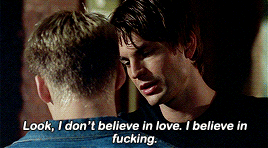
Brian has the opposite problem to Justin’s clinginess: he’s dead inside and pushing everyone away from him. Brian acts like he owes nothing to anybody and desperately has sex with every man he can, and makes a “big spectacle of everything” (as Debbie tells him), all in a childish attempt to feel something, anything at all. He wants to be human. He wants to be alive. But he doesn’t feel like he’s either of these things. His refusal to grow up is not so much a rejection of maturity so much as it is a rejection of his life in general: how can you grow, when you were never alive in the first place?
Justin’s clinginess, while initially a flaw, is actually what makes the relationship perfect: Brian would never grow if he was not relentlessly pursued by someone who also asked things of him (Lindsay and Michael, while great friends, rarely ask things of Brian, while Justin does). Justin's childlike faith in humanity in some ways (and, admittedly less-charmingly, black and white way of thinking) helps Brian experience those things for the first time. The irony of course is that Justin seems like he wants to grow up--have sex, move out of his home, getting a fake ID--while Brian claims he wants to stay young, yet before Justin avoids anything actually innocent. When he finally starts opening up to Justin and his innocence, he’s confronted with what he’s been avoiding the entire season: grief.
Brian needs to grieve his own nightmare childhood and his own issues, or else he can’t ever grow or feel human.
To be human is to accept loss, accept that you aren’t superman, that you can’t control things. Literally the entire season is about the writers handing Brian challenge to grieve after challenge to grieve and him denying it until it smashes into the head of innocence (Justin).
Firstly, Brian is tasked with whether or not to pull the plug on Ted when he’s in a coma, a choice that he thankfully doesn’t have to make when Ted wakes up. Then, Brian’s father tells him he’s dying and Brian finally tells him he’s gay (with horrifying results). His father dies (symbolic again of one symbol of his nightmare childhood passing away), and Brian doesn’t cry, which everyone points out is odd. Brian also ruins his relationship with Michael, and refuses to grieve it, pretending it’s all fine. While they do reconcile, Justin and Michael do more work to bring them back together than Brian does (speaking of, the scene where everyone leaves in disgust, telling Brian off for his cruelty at Michael’s birthday party, but Justin tells Brian “someone’s gotta help you clean this mess” was clearly a double-meaning and a genuinely heartwarming moment). Then, Brian struggles with signing away his parental rights to Gus to help Melanie and Lindsay, and does so in a bold moment without much grief. Brian treats Justin terribly on and off, but doesn’t grieve it because he tells himself that’s just who he is.
However, Justin in season one, despite being a portrayal of innocence, also treats other people pretty poorly. (Brian is largely the exception.) His father is the worst, but Justin is also a brat with an immature understanding of love and people. He does his best to alienate his mother early on. He antagonizes people when he doesn’t have to in order to show off and prove he deserves to exist (like outside of Babylon when he tells everyone he gave Chris Hobbs a handjob, a moment where Brian warns him directly that he’s now “made a real enemy”). Justin’s brattiness is clearly coming from a place of pain and repression, so to be clear there is no moral equivalence there: he only humiliates Chris because Chris has been humiliating him throughout the series.
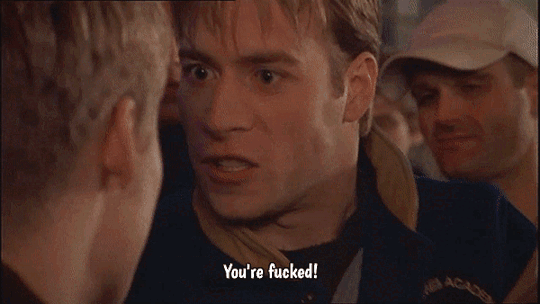
Justin also tries to convince Brian not to sign away his parental rights at first, which hurts Melanie and Lindsay, because Justin projects his own parental issues onto the situation without considering that Brian is not his father and the people involved are so different the two situations shouldn’t be compared. Plus, if anything, Justin puts too much responsibility on others, and is challenged to accept that he cannot control other people and how they feel or act towards him (Daphne falling for him, Brian, trying to win his father’s approval by considering business school despite his father’s hatred of him, etc.) This idea of putting too much responsibility on others is childish and normal for someone his age, and makes Justin and Brian very similar while also having contrasting ways of handling their relationships (clinging vs pushing away).
This all culminates in the finale where Chris tries to murder Justin right when he and Brian seem to finally be happy at Justin’s prom. It’s only then, when Brian sits bloodied in a hospital waiting room, that we see him finally give in, grieve, cry, in the same place he and Justin named his son in the first episode.
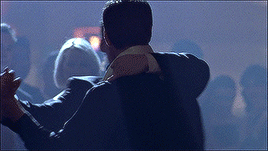
Justin’s lost a sense of innocence. Brian realizes that he is not the island he pretends to be, and that being human hurts.
Justin and Brian: Being Human Means Accepting the Worst of Yourself (Season Two)
Michael to Brian: I think you're afraid to let anyone know you love them. That you have feelings. That you're human like the rest of us.
Throughout the second season, Brian hides the best parts of himself (literally not allowing anyone to know that he visits Justin every single night he’s in the hospital). Brian also self-sabotages himself by demanding Justin hide the best parts of himself (loving Brian) with their semi-open arrangement that fails epically, and Justin leaves him. But part of the reason is fails is also that Justin starts becoming more like Brian, even imitating Brian in word and action when he sleeps with a virgin, and... big surprise, neither of them like Justin becoming more like Brian. Justin doesn't want to be Brian, and Brian doesn't want to be Brian either.
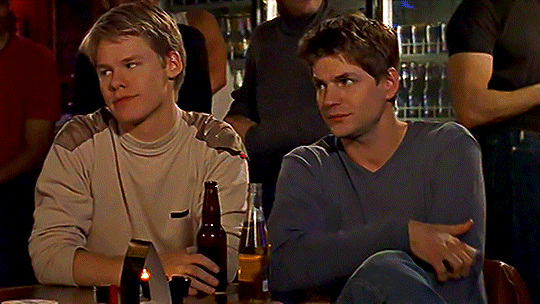
Despite Brian’s narcissistic persona, the dude basically embodies the concept of “methinks thou doth protest too much.” See: him pissing on art of himself as a hero. After, Justin demands a real apology for that--directly telling Brian that his vague “sorry” isn’t good enough, and Brian gives i. A few episodes later, this scene then repeats after Justin starts his affair with Ethan with almost the exact same dialogue, but this time Justin is the one giving a vague apology, and Brian isn’t strong enough to ask for a specific apology.
Justin: I’m sorry.
Brian: For what?
Justin: You know what for.
The point is again that Justin is becoming more like Brian, and it’s not a good thing.
As long as Brian hides the best parts of himself, their relationship is doomed. It’s not a coincidence that after the first time Justin tops him, after Brian literally lets Justin inside, Brian immediately panics and starts causing problems. Brian doesn’t acknowledge Justin’s birthday besides literally hiring him a hustler to symbolize how he’s pushing Justin into another person’s arms (Ethan). To highlight this, we have Ben and Michael’s birthday celebration as a foil, where Ben is upset over his declining health and behaves terribly. However, Ben apologizes, and Michael tells him a major theme:
Ben: There’s no excuse for it. There’s no excuse at all.
Michael: Sure there is. You’re human.
The point is that Brian and Justin are human too, as much as Brian tries to deny his own humanity. Human beings make mistakes. And that becomes a major motif of the third season.
Justin and Brian: Being Human Means Accepting the Best of Yourself (Season Three)
When we see Justin and Brian in the opening of season 3, Brian is still so defensive over Justin despite Justin publicly humiliating and leaving Brian that Brian punches his best friend, Michael, for suggesting that he shouldn’t have saved Justin’s life. This again ties into Brian’s self-hatred: he expects Justin to leave him, even feels he should. But Brian finds it easier to fight someone else on Justin’s behalf than to fight himself to keep Justin; numerous characters comment that Justin left because Brian didn’t fight for him, and they’re right.
Brian and Justin are still stuck on each other, and shown through their indulgence of illusions (fantasy vs reality is another motif throughout every season). Brian literally hires a hooker to dress up as Justin, and Justin focuses on Ethan who is whom Justin thinks he wants Brian to be, only to discover that Ethan is Justin at his worst: brought to life by art, yes, but a cheater, and a liar.
As viewers, we recognize issues all along: for example, during a sex scene, Ethan directly tells Justin “don’t be nervous;” this stands in sharp contrast with Brian, who had previously told Justin that he was clearly “terrified” when they first got together. Brian acknowledges Justin’s fears; Ethan pretends they don’t exist. Ethan wants an illusion; Brian wants the real thing.
We also see the “real you” aspect of Brian and Justin’s relationship foiled with Ben and Michael’s struggle over Ben’s HIV. Michael almost wishes he has HIV to relate to Ben more, and this plotline climaxes in Michael holding a needle to his arm, contemplating giving himself it to be more like Ben, and this line:
Ben: I don’t want you to be like me!
There are other relationships in the show, even nonromantic ones, that emphasize that Brian can’t accept the best of himself. Brian refuses to accept any thanks for saving Ted’s ass, because he’s still denying the best parts of himself. Both our good and bad traits make us human: Brian needs to accept the best of himself, and Justin needs to accept the worst.
Brian and Justin finally face each other while having sex with other people in Babylon’s backroom, but lock eyes and it’s clear who they wish they were with. They have to accept themselves at their best and at their worst to be able to accept each other at their best and worst.
Fortunately, that’s precisely what happens. When Justin decides to win Brian back by interning at his company, he gives him a sincere compliment that Brian can only smile at (ie, Justin confronting Brian with the best of Brian’s traits):
Justin: I've already learned more than I would in an entire semester of school... Which says a lot about you, actually.
Brian: About me?
Justin: Yeah. They say the tone of the workplace is established from the top. So it's a great compliment to you that you have such a dedicated and hardworking staff.
And Justin is then able to show Brian that yeah, he knows Brian’s worst traits. And even with his worst self, he still thinks Brian’s best traits make him worth it, and that Brian can actually become better, grow.
Justin: If you had any brains at all you would never have let me leave. You would've told me I was making the biggest mistake of my life. That I would live to regret it. That what you gave me was worth a thousand--a million times more than anything he had to offer. You would have told me that you loved me, and that you would go on loving me even after I was gone.
Brian then confronts Justin on his worst traits:
Brian: That is so like you! You don't hear what you want, so you leave! Try standing up for yourself for a change!
Aaand then Justin is able to admit his best traits:
Justin: I decided you should take me back... even though I’ve made a few mistakes, I think you’d be making an even bigger one not to give me a second chance.
In other words, when they get back together, they’re able to see each other as fully human.
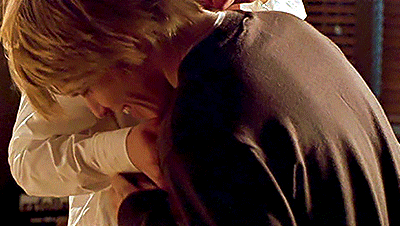
When they get back together, Justin and Brian are able to pretty much save the world by stopping Stockwell. Debbie outright states the season’s main theme after Brian gets fired for sabotaging Stockwell (such a smallscale Trump it’s almost eerie):
Debbie: it's your innate goodness.
Brian: *laughs*
Debbie: we all know good from evil and you’re no different.
Again, the “you’re no different” line emphasizes that Brian is human despite his denials thereof, and being human is not just about fucking and being selfish--it’s about love and community and a long arc towards justice. And then Brian finally becomes the hero Justin and Michael have always believed him to be and gives up literally everything he owns--everything except the people who love him, honestly--to stop Stockwell. Not only that, but no one except his closest friends will ever know he is the one who saved the town.
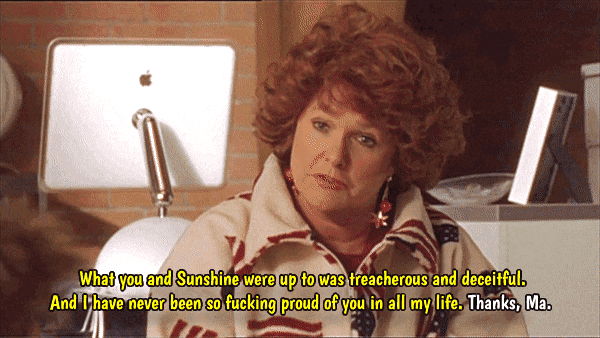
The idea of accepting the worst/best of yourself is also foiled in the finale when Ted reunites with Blake. Ted cared for Blake because Blake brought out the best in Ted--his generosity and kindness and belief in goodness of humanity--but was destroyed by the worst (Blake’s addiction). At the rehab where he once dropped Blake off, Ted finds himself a patient, and Blake as his counselor--showing Ted that there is a future, that the best in you is never dead no matter how far you’ve sunken. You can always find it again.
Justin and Brian: Being Human Means Accepting Help (Season 4)
Season 4 at its core is about learning to be weak and ask for help. Ted needs help finding a job. Ben needs help processing rejection of his manuscript. Brian needs help keeping his apartment. But none of them want to feel pitied, and so they flounder.
One of the ways people can need others is to need others to forgive them. Obviously we have Blake and Ted, Ted and... everyone after his addiction, Debbie forgiving herself for the way she treats Vic, and Brian and Justin forgiving each other and therefore forgiving themselves.
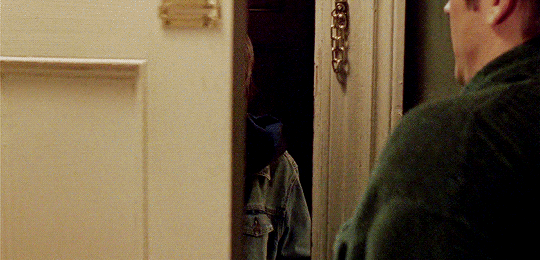
Obviously this was first set up in Season 3, when Brian forgave Justin for leaving him, but it’s further expanded on by repeating a lot of season two’s elements... in a way that doesn’t feel repetitive but instead shines a light on just how much growth the characters have undergone.
Justin’s brief foray into vigilantism is clearly paralleled with his foray into gogo dancing in season 2: both Brian warns him about, but Justin insists he can take care of himself only to get way in over his head. With gogo dancing, the boss sexually assaulted him; with the vigilantes, Justin ends up realizing that Cody is not that different than Chris Hobbs--he’s cruel, he’s hateful, he’s violent, and he only wants to use Justin for his own pride. But instead of how Justin allowed his guilt over needing Brian’s help for school to drive them apart after the gogo incident, this time Justin allows himself to get closer to Brian after realizing Brian was right. Justin also doesn’t forgive Chris Hobbs (nor really should he), but he does realize the pointlessness of revenge.
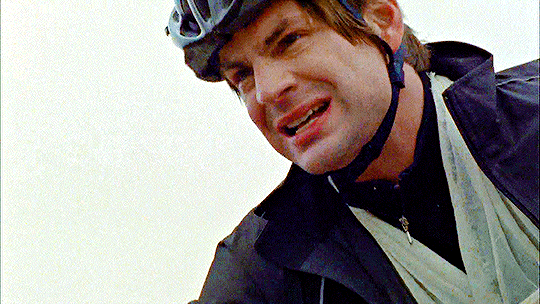
Brian then needs help but resorts to I can take care of myself when he’s diagnosed with testicular cancer. He lashes out at Justin and refuses to tell Justin what’s really going on. Brian’s lashing out becomes particularly cruel where he essentially tries to force Justin to leave him... only for Michael to show how much he’s grown by intervening and mediating. When Brian comes home sick to find Justin cooking soup for him, Brian falls to the floor and is literally struggling to get up from a fetal position (hello, obvious symbolism):
Brian: I’m all right!
Justin: You're not all right.
Brian: Then why are you asking me?
Justin: So I can tell you what a motherfucking piece of shit you are for not telling me! For shutting me out! For thinking that you could handle this on your own! And most of all for thinking that I would leave you! Why would you think that? 'Cause you had a ball removed? 'Cause you're no longer perfect? Well, believe me, Mr. Kinney, that is the least of your imperfections! And if I wanted to leave you, I've had plenty of better reasons.
Brian: Well, maybe you should have.
Even though it’s framed as an argument, it’s actually Brian finally opening up. The look on Justin’s face when he realizes that Brian has finally told him the truth that he’s not been able to admit the entire series--that Brian hates himself, that he thinks he doesn’t deserve any love--was stunning. He said some pretty cruel things to Justin, yet Justin forgave him. Sometimes, that’s the best help someone can give--even the only help.
Brian and Justin: Being Human Means You Can’t Control Others (Season Five)
Brian: My mother was a frigid bitch. My father was an abusive drunk. They had a hateful marriage, which is probably why I am unwilling or unable to form a committed long-term relationship of my own. The fact that I drink like a fish, abuse drugs, and have more or less redefined promiscuity doesn't help... much. As a result, I've lost the two people in my life that mean most to me.
Season 5 is all about everything changing and the resistance people have to change, but that doesn't mean the love that grounds it goes away. Melanie and Lindsay break up for a bit, Debbie leaves the diner only for a copycat to take over, Babylon changes when Brian buys it... and then when it explodes.
Season 5 really explores the limits of change and what can and cannot change. Brian in particular has always used being gay as an excuse for why he doesn’t feel human, when his issues are far more complex than that. His being gay won’t change and shouldn’t (despite what the homophobes scream out their cars in certain gutwrenching scenes), but his attitude towards himself and others and towards his own sexuality can and should and does.
Despite not feeling human and supposedly being very “live and let live,” Brian is actually something of a control freak, as becomes increasingly obvious in season 5. He lashes out at Michael for marrying Ben and setting up house, at Ted for pursuing a monogamous long-term relationship, at Justin for wanting commitment. Everyone moves on, but Brian is terrified of losing the only ways he feels alive... and he’s still stuck in a childish, egocentric mindset that he controls the world. (Justin has his own issues with control this season; namely around his mother’s new relationship, Michael and Ben struggle regarding Hunter leaving, etc).
Brian: Before you and your husband tied the noose around your necks he was perfectly happy! But now, he's a defector, just like the rest of you!
Michael: He was never perfectly happy! Waiting for years for you to say "I love you, you're the only one I want."
Brian: That's *not* who I am!
Not only that, but there’s certainly irony in Brian claiming he “accepts” (his term) Michael’s choice for domestic life, but he clearly does not. The concept of “home”, which has been a motif for Brian and Justin’s relationship since the very first episode where Justin points out he’s not able to go home and hence he stays with Brian, and how Brian negotiates their semi-open relationship in season two with the idea that he wants to “come home to” Justin, comes up again in this same scene where Brian confronts Michael and blames him for Justin moving out:
Michael regarding his house with Ben: It's a home!
Brian: It's a farce! It's a freak show!
Michael: ... (Justin) didn't leave because of (me). He left because of you. Who wouldn't?
Again, there’s irony here. The “farce” and “freak show” are comments Lindsay’s parents have lobbed at her marriage to Mel throughout the show. Yes, Brian, resident gay stud of Pittsburgh, has some serious internalized issues that brush up against homophobia and that just boil down to the same issues driving many of the show’s antagonists: control. Wanting to be God, not human.
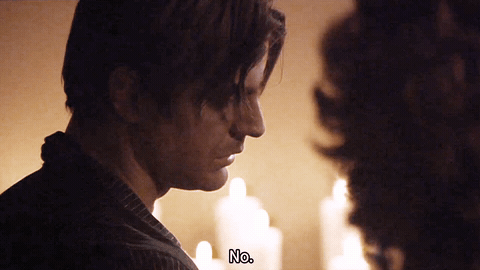
Brian needs to accept the limits of being a human being. You cannot control others. When you love them--to truly love someone--you don’t even try. You give them free will. You love them. You support them. I’m sure you can see the parallels between the general portrayal of the Prop 14 supporters who are using religion throughout the season to try to control others and claim it’s love when it’s blasphemy to call that love.
As usual, Debbie is the voice of decency, not only by yelling at the religious protester “JESUS THINKS YOU STINK!” but also by saying to Brian:
Debbie: your problem is he left you. He left you, and he moved on. Only he didn't. You and he just made different choices, that's all. Doesn't mean that you don't still love each other.
Everything reaches a head when Babylon--symbolic of not just the gay community in QAF, but of Brian’s entire life--literally explodes. That scene is horrifying, disorienting, brilliantly shot and nauseating (like, I almost threw up, and it’s not gory at all--it’s just devastating, and the pure emotion hit me like a sack of bricks).
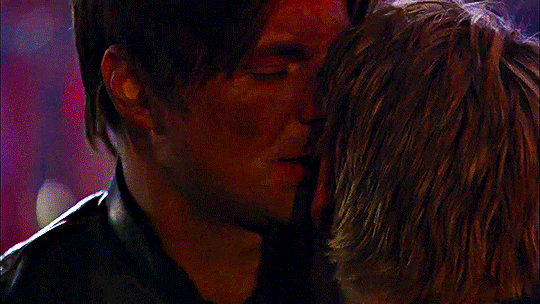
Justin and Brian choose not to control each other, which is actually a sign of love. About the finale, it has its own section below.
The High Cost of Living
Justin: time will inevitably leave its mark... we should accept our mortality with dignity.
One of the things about growing, and growing up, is that you inch closer to death. There is no growing up without wrestling with mortality.
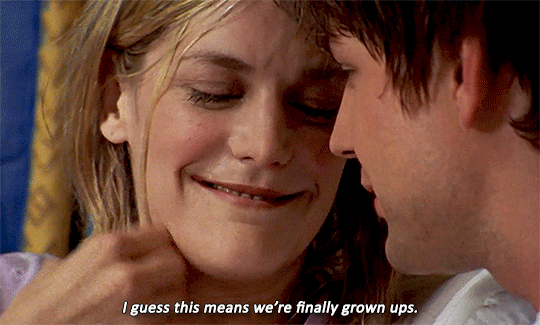
Brian in particular is called out by the narrative constantly. By episode 4, Ted forces Brian to be his power of attorney, to make the final decision whether he should live or die, because Brian needs to make the same damn choice. It’s the central choice Brian will have to make in the series: does he want to live? Because if he wants to live, he has to grow. And the rest of the remaining five seasons constantly ask Brian to think about what that means, holding his feet to the fire and forcing him to grow.
The concept of aging is brought up in terms of this as well. From the start, Brian is terrified of turning 30 (oh boy, I feel ya there, Brian). He’s even suicidal at the thought, because he can’t fathom being older which has dual meaning for his character: firstly, that he’s stuck in adolescence emotionally, and secondly that he’s afraid to take charge of his own life. If he does, he’ll have to take responsibility for things. Being forced to take responsibility for not just Gus, but Justin, Lindsay, Michael, and other moments... it was good. Being young isn’t demonized either: in some ways, Brian being with Justin is a symbolic (literary please I’m not talking real life problematic elements) way of Justin meeting Brian at that age emotionally, and them growing together. Debbie even says that they are “pretty evenly matched” maturity-wise. It’s also a real-world psychological fact that people who experience trauma as children can become emotionally “stuck” at that age, unable to move past it.
All of this ties into the PTSD motif with both Brian and Justin suffering from the disorder post-Chris’s attack. PTSD can make you feel like you’re not really living, which the show displays. A psychiatrist tells Brian:
It's like a fairy tale, Rapunzul or Hansel and Gretl, but the cage is his mind, and it's up to you, the handsome prince, to release it.
This applies to more than just Justin’s repressed memories of the attack; it applies to their entire relationship over the course of the show. They have to escape their cages of trauma and terrible coping mechanisms in order to fully, truly live. Justin is as much the handsome prince to Brian’s trapped Rapunzel as Brian is a prince rescuing Justin--for the entire show.
In season 3, Justin even directly tells Brian that the latest comic based on Brian is about: "It's about thawing his cold heart, bringing him back to life. It's about their love. It's about commitment." Those elements give life.
Season 4 is where the motif of life and death really picks up again, when Vic dies and Brian is diagnosed with testicular cancer. Brian contemplates letting himself go out in a blaze of glory, young and handsome, but in the end goes through with the treatment (which involves removing a testicle) after spending time with Lindsay and his son Gus, with Michael, and with Justin telling him that he loves him again.
The finale of Season 4 has Brian breaking his collarbone and still insisting on finishing the bike ride. Brian is literally in front of a graveyard on the path when Michael shows up next to him and insists that if he’s going to do this, they’re going to do it together. They come to the finish line hours after everyone else has finished, and Brian, in agony, decides he’s close and enough and wants to stop.
But then he sees Justin waiting for him over the finish line, along with Debbie who loves him like a mother, and Ben (Michael’s newlywed husband) and Hunter. And he’s motivated to push forward and finish well, despite the pain because the people who love him want him to live.
The Scarf and Art as Life
That bloodstained scarf Brian buys himself for his thirtieth birthday becomes a beautiful symbol of not just Brian and Justin’s relationship, but Brian’s life, which is forever tied to Justin. Brian at first buys the expensive scarf to indulge himself (as he starts the series doing in spades), then uses the scarf to get off and simultaneously flirt with dying via autoerotic asphyxiation, and then finally uses the scarf to dance with Justin. But the scarf becomes soaked with Justin’s blood after Chris’s attack, and yet Brian continues to wear it.

He can’t take it off, because it’s their lives in a symbol. When Justin starts to remember what happened, he uncovers the scarf on Brian. When they make love for the first time after the attack, the camera focuses on the scarf lying beneath their feet.
Justin’s life is his art, which Brian directly says in the first season, and which Debbie emphasizes by telling Justin as he wrestles with whether or not to go to Dartmouth for business like his father wants or to pursue his art (his own life):
Debbie: you don't have the power to get [your parents] back together. But you do have the power to fuck up your own life. So make sure you think twice before you do it.
Chris’s attack almost steals Justin’s life and his art (literally, though the damage to his brain and hand) from him. When Justin struggles with his recovery and considers dropping out of art school and Brian buys him a computer so he can do digital art, he reacts angrily:
Justin: You can tell everyone you fixed Little Justin's problems? Well, you can't fix this. No one can.
In season 2, Brian pissing on Justin and Michael’s comic is really symbolic not just of the injustice he did to Michael and Justin’s lives, but also symbolic of how he feels about himself (as Debbie says, they literally based the hero on Brian, because “you’re their hero”).
At the end of the series, when Justin goes to New York to pursue his art fulltime, it’s symbolic of him being fully alive--and symbolic of Brian being so as well. Why? Because Brian’s life is tied to Justin’s, forever and always. If Justin lives freely and succeeds, then Brian will as well. Brian telling Justin to go was him choosing to live fully and freely for the first time.
Religion, Fathers, Mothers, and Sons
Justin: I've caused them enough pain.
Brian: It's bullshit. They cause their own pain just like everyone else.
There are so many parental relationships in the series, and they span from the horrific to the beautiful. Debbie is the mom I want to be, and good religious rep... in contrast to, say, Brian’s family, which is horrifying. I mean, Brian’s dad legit telling his son “it should be you who’s dying” when Brian tries to finally tell him he’s gay after his father’s terminal diagnosis was a moment I audibly gasped in horror.
Brian’s mother, however, while horrifically homophobic, cold, and emotionally and verbally abusive, was still very humanized in that it’s clear she has no one to love her and be kind to her. Brian’s kindness is to not take her faith from her. I also liked the priest character, because he was upfront that he never taught anything but God’s love, and God was whom he answered to. He also pointed out to Brian that he has someone he can always count on and have around: God. For Brian, that person is Justin (the religious motif is emphasized also by the fact that Justin tells Daphne “I met God” after meeting Brian the first time, and by the scene in the final season when Brian prays with Debbie for Michael to survive his injuries--although, as both say, they aren’t asking God so much as they’re “telling” (which btw is actually biblical lol). But the point is that Brian then goes and tells Justin the truth finally: that he loves him).
Debbie moms everyone in the group, and helps Jennifer learn to be a better mom to Justin as well. But Debbie can herself grow as well: she projects her fears and trauma over Vic’s illness onto Ben and Michael, and allows her own insecurities to ruin her relationship with her brother.
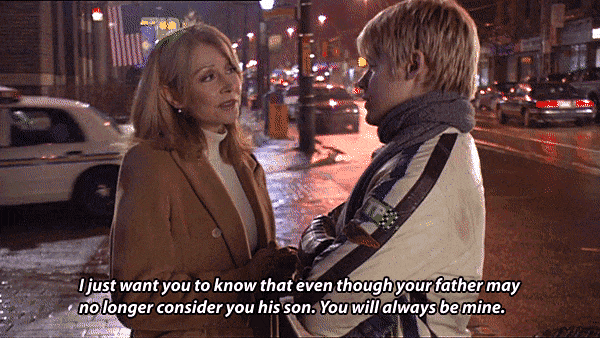
Justin’s father is terrible, but Jennifer is instead well-intentioned and flawed, fairly complex. She at first blames Brian for Justin’s injury, and Brian ironically chooses to believe her (that it’s his fault) over Justin (who directly says “it’s not your fault” multiple times while embracing him). Again, this is symbolic of Brian’s childishness (believing a parent over an equal), but what helps is how Jennifer grows and apologizes to Brian, asking him to help Justin instead. By showing Brian that growing doesn’t always mean turning into a miserable, angry bastard, Jennifer actually gives Brian a good example of how to stop being an asshole.
Parents can grow, because parents are human.
Injustice
Ben: Your children lead privileged lives, and you dare to laugh at my son's misfortune.
By the end of season one, the relationships we’ve been following all reach significant moments: Blake runs away from rehab and thereby from Ted, and he has to face that he cannot save Blake. Michael moves to Portland with David, taking a risk that ultimately doesn’t work out. And Brian finally makes a good choice, coming to Justin’s prom. The couple that made the best decision for each other in that episode? They’re the ones that end up in the worst tragedy, when Chris attacks Justin. It’s wrong, it’s infuriating, and it’s devastating.
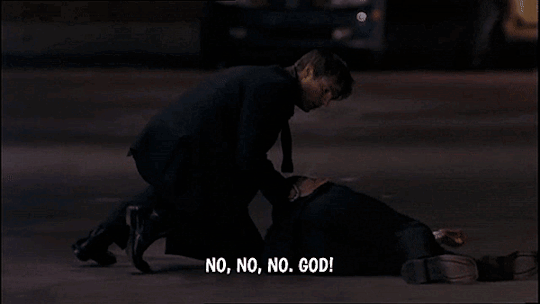
It’s also unfair in another element: the narrative has been challenging Brian to grieve, but Justin being the one actually to almost die seems horrifically wrong--and that’s the point, and what makes it powerful. Justin did nothing wrong insofar as learning to grieve goes, but he pays the price. In this, the show calls out a double standard in society, shows us how unfair it is. The innocent, the childlike sunshine, pays the price for society’s bigotry, for adults inability to healthy process emotions, for all of it--burdens they should never take on.
The motif of injustice comes up again and again throughout the show: Lindsay’s parents paying for her sister’s three weddings yet calling Lindsay’s marriage to Melanie not “real.” Hunter being targeted at school for having HIV after being abused physically, mentally, and sexually his entire life, the pursuit of justice for the murder of Jason Kemp, Michael and Ben not being able to legally marry, the issues around adoption... we also never really find out who attacked Babylon. These plotlines are seldom resolved with feel-good bows (with the exception of Jason Kemp’s murder), because there’s still work to be done in the world.
Love: An Unconstrained Risk
One of the main symbolic messages of the show, especially when taken in the context in which it was made (early 2000s, before same-sex marriage was legal in any state in the USA), is that love can’t be easily defined or put into a box, but love is powerful and life-giving. The fact that most of the romantic relationships in the show were, obviously, queer, highlights this. The romances also weren’t limited by age--we have younger, older, and elderly people falling in love--or by health.
Whether or not legal marriage was allowed, the love and commitment Melanie and Lindsay have is real. Ditto for Ben and Michael. Despite the weird, even creepy on the outset age differences between Emmett and George (and to a lesser degree Justin and Brian), both of these relationships ended up being really beautiful. Love isn’t even defined by time or broken by death: it goes on and on. That’s one of the main messages of the ending--that time and space have little say in the love Brian and Justin have for each other. Love will not, cannot be constrained by forces manmade or intrinsic to the universe. (That said, I still would have liked to see them actually get married, because there was foreshadowing for it... but the ending is well-written.)
Love also comes with risks, which itself is a theme that ties in with the concept of being in the present moment (another theme). Marriage is a risk for Lindsay and Melanie, Ben and Michael, Brian and Justin, Debbie and Horvath--and not choosing to marry is a risk as well in the latter two cases. Moving to Oregon with David only for it not to work out for Michael was a risk, as was choosing to love Ben despite the fact that people were warning him about Ben’s HIV positivity. Vic moving out with Rodney was a risk. Tucker and Jennifer was a risk. Ted falling for Blake was a risk that seemed to not pay off, but then later did.

There is no love without risk, and the tides may not run smoothly, but it doesn’t make it any less real and eternal. This applies to an extent to self-love as well. Drew coming out, Melanie and Lindsay giving themselves permission to get married, Brian really only learning to love himself through loving and caring for Justin.
The idea of love as a risk is honestly most fully embodied in Michael’s character as well, particularly in the motif of fantasy vs reality. Michael’s major issue early on was his unrequited love for Brian, which made him leaving with David a good choice for his character... even if it was obvious the relationship was doomed. Why? Because David clearly loved the idea of Michael more than Michael himself, and Michael loved the idea of David and the white picket-fence life (which he genuinely wants and does get) more than the reality of who David was. With Ben as a husband and Hunter as their son, it was hard, riskier than staying in reveries.
The Finale
Which is again why the finale works from a literary perspective even if my taste is to like things neatly wrapped up. Instead of marrying, they commit to loving each other without full guarantees, because they both still have a little more growing up to do (honestly, QAF is a bildungsroman). Brian’s finally saying the words “I love you” was progress; the proposal was less so because it was made out of fear, out of I can’t risk losing you, rather than a full maturation. But you have to risk in love. I honestly think the implication is that Brian and Justin will end up together for real, probably married, since it’s still abundantly clear that what they want is each other, and they are forever each other’s life; we don’t necessarily need to have it spoonfed to us to see the narrative implication.
I mean, really. The narrative showed us at the start of season five that Brian made room for Justin to move in even while not expecting him to come back from LA (showing a part of him does know they’ll be together), called out the fact that Brian didn’t return the rings, they promised to visit, and how. many. times. did the series have Brian fantasize about going to New York for some fancy life, while Justin’s fantasies were always about ending up married with the love of his life? It’s pretty clear their goals do align--there’s just still more growing to do first. Yes, no future is guaranteed, but the hint at an off-screen happily-ever-after so blatant I’d barely call it a hint. We even have, back in season 4, Vic’s post-death pseudo-spiritual visit to Brian’s dream, where he tells Brian he was lucky to get four more years after his almost-death, but “you’ll have a lot more than that.”
Also again, season 4′s finale can be seen as symbolic of where it’ll end up. Michael and Brian move towards the finish line, Brian, because he’s crippled in pain and literally broken, is running hours later than everyone else. But with Michael pushing him towards the finish line--where Michael’s husband and son wait alongside Brian’s partner in Justin... well, it’s clear they’re still pushing towards that line by the end.
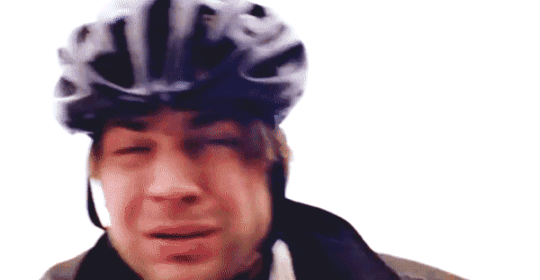
And finally, all the foreshadowing of an off-screen married happily-ever-after ending for Brian and Justin in season 5: Justin going to LA and coming back, despite Brian thinking he won’t. Hunter leaving, and then returning. (Let love go, and it’ll come back.) Someone remarks that it is “magical thinking” that Melanie and Lindsay would get back together, and Emmett responds “Well, you never know.” Lo and behold, they do get back together, despite reaching the lowest of the low in their relationship and doing things to each other that could honestly be seen as unforgivable. Blake and Ted reunite at last, because it had always been “right person, wrong time” for them, and it was finally time. I kind of don’t think the main relationship of the entire series is supposed to be the exception.
Being Yourself
Michael: ...being different is what makes us all the same. It's what makes us family.
Of course, another main theme throughout the show was that of being yourself. It’s pretty expected for a queer show, but QAF gives it a unique twist in how it emphasizes this (not just in season 3). But starting in season one, Brian tells Justin he’ll go on to meet lots of other guys, and Justin replies that he doesn’t want other guys: he wants Brian. The rest of the show is precisely about Justin discovering what that means. The end is Justin still wants Brian, but he doesn’t want Brian to deny himself completely--that’s actually Justin showing that he really loves and wants Brian as he is.
But, the show also emphasizes that no person is an island. People do need each other, and the things we do with our lives do affect others. See again: Brian choosing to go through with his cancer treatment for the sake of his loved ones, Hunter desperately needing Ben and Michael as his parents, and how when the community bands together, they’re really able to accomplish the unbelievable, even the miraculous (taking down Stockwell, rebuilding Babylon).
Stuff I Didn’t Love
The season 3 plotline with Brian’s nephew accusing him falsely was a retread and not a good idea: the idea that kids often lie about that is just not particularly helpful (because it’s not true), and the plotline/challenge for Brian’s character was done much better with the sexual harassment suit from Kip in season one.
The season 4-5 plotline of Lindsay cheating on Melanie and the ensuing custody battle was another retread of Melanie cheating in season one and while it did ultimately not ruin their characters (which it could have done; to their credit the writers made it work), it wasn’t exactly the best choice of writing either.
Emmett and Ted had no chemistry so I could never buy them as anything more than filling space, which I think was the point in the end, but for a few episodes it seemed to be taken too seriously as something to root for when it... wasn’t.
Overall Impression
I’m drawn to stories about existentialism, stories that explore nuance and empathy, stories with themes like what it means to be human, stories that aren’t sanitized for the sake of a moral message (biggest fear for any reboot right here). Maybe it’s again the fundie upbringing, but I constantly feel like I have to earn the right to exist and struggle with accepting both the best and worst aspects of myself, and media that explores questions more so than hammers a message appeals to me (because I actually feel like the messages of these media pieces comes across stronger). Queer as Folk is all of those things, plus some really tight writing and excellent symbolism for any literature nerd to salivate over (most shows never use symbolism anymore! Never!)
In some ways, certain aspects make it very much a product of its time, but in other ways, it’s timeless. It’s really an artistic masterpiece that reminded me of what I love about humanity and life itself, that makes absolutely no apologies for its stance on love as something powerful (another thing missing in modern media: the concept that love wins), that doesn’t give us simple answers for what it means to recover from trauma as individuals and as a society, that doesn’t write literally any single character off as a one-note person who can never change while at the same time acknowledging how hard, long, and winding changing is, and what can and cannot change in a human.
On a personal note, realizing, after I’d finished the show, its connection to a genuinely traumatic childhood moment that actually, years later, helped me escape me a cult adds another piece of sentimental value. And @our-mathematical-universe, you were right when you nagged me to watch this over the past few years.
10/10
#qaf#queer as folk#queer as folk us#britin#brian kinney#justin taylor#emmett honeycutt#michael novotny#ben bruckner#hunter novotny-bruckner#hunter montgomery#lindsay peterson#melanie marcus#debbie novotny#vic grassi#blake wyzecki#ted schmidt#qaf meta#hamliet reviews#queer as folk meta#britin meta#qaf us#qaf 2000
345 notes
·
View notes